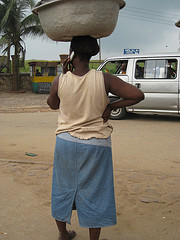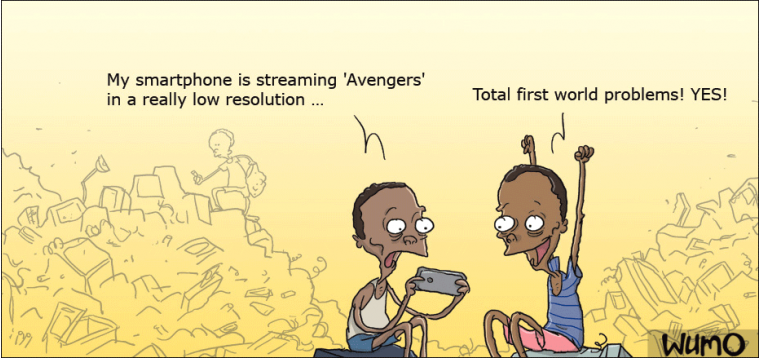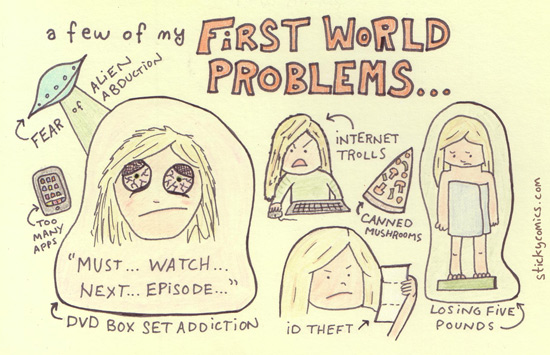 A follow-up from the last post, I’ve recently had a change of mind about the idea of “first world problems”. For those not familiar, this is a hash tag on Twitter and a general internet trope that you add on to a complaint you make. It’s meant to show that you recognise that your problem is somewhat trivial in the scheme of things, that you are privileged to even be having this problem etc etc. To show some examples, I’ve pulled up the some tweets that have recently appeared under #firstworldproblems. (NOTE: It’s a very popular hash tag with about 15 tweets every minute).
A follow-up from the last post, I’ve recently had a change of mind about the idea of “first world problems”. For those not familiar, this is a hash tag on Twitter and a general internet trope that you add on to a complaint you make. It’s meant to show that you recognise that your problem is somewhat trivial in the scheme of things, that you are privileged to even be having this problem etc etc. To show some examples, I’ve pulled up the some tweets that have recently appeared under #firstworldproblems. (NOTE: It’s a very popular hash tag with about 15 tweets every minute).
- Stupid on-demand hot water heater needs fixed. Have to wait until tomorrow sometime for hot water #FirstWorldProblems
- I’m hungry and there is no pizza in the freezer #firstworldproblems
- Everything hurts, and kinda wish I could do 4 days back to back park laps to get better. #snowboarding #firstworldproblems
- My computer crashed so now I have to write out my notes by hand #firstworldproblems
- My Droid battery never lasts from the whole day. #firstworldproblems
I remember realising this when I was talking to my partner about the fact that it was hard to find a method of backing up my computer files that was sufficiently good to guard against my paranoia. “First world problems!” she said jokingly. And I agreed but it got me thinking. The things I actually want to back up are things that I’ve created (eg. writing, videos) or things unique to me (eg. photos). But then this isn’t actually a first world problem. Surely people in the poorest, most conflict-ridden countries have writings, photos and so on? Especially with photos I would imagine that people everywhere worry about their safekeeping and take steps to protect them.
Of course the wider point is that the very idea of first world problems can contribute to the assumption that people in “third world countries” are simply victims. This robs agency from an enormous population, not to mention continuing the divide discussed in the last post. Of course it’s good to recognise how lucky you are and how much better you have it than most people in the world. That part’s not controversial. But it shouldn’t come at the expense of ignoring how alike we all are and how far normalcy stretches. Being poor or even hungry/sick does not extinguish our shared human pursuits of (say) fun, sex, entertainment and so on. The assumption that it does is not only patronising but can do real harm. As a very basic example, hungry people can be just as preoccupied with TV and entertainment as “we” are.
After musing on this for a while I was glad that Andrew Sullivan pointed to a similar sentiment by Teju Cole:

I don’t like this expression “First World problems.” It is false and it is condescending. Yes, Nigerians struggle with floods or infant mortality. But these same Nigerians also deal with mundane and seemingly luxurious hassles. Connectivity issues on your BlackBerry, cost of car repair, how to sync your iPad, what brand of noodles to buy: Third World problems. All the silly stuff of life doesn’t disappear just because you’re black and live in a poorer country. People in the richer nations need a more robust sense of the lives being lived in the darker nations. Here’s a First World problem: the inability to see that others are as fully complex and as keen on technology and pleasure as you are.
One event that illustrated the gap between the Africa of conjecture and the real Africa was the BlackBerry outage of a few weeks ago. Who would have thought Research In Motion’s technical issues would cause so much annoyance and inconvenience in a place like Lagos? But of course it did, because people don’t wake up with “poor African” pasted on their foreheads. They live as citizens of the modern world. None of this is to deny the existence of social stratification and elite structures here. There are lifestyles of the rich and famous, sure. But the interesting thing about modern technology is how socially mobile it is–quite literally. Everyone in Lagos has a phone. [Source]
Of course the second paragraph deals more with the middle class which is still a fairly small proportion of what we consider the “third world”. But the first paragraph summarises the wider problem. Bottom line is that people are a lot more similar than you think and the problems you consider normal are also normal around the world.





0 Comments